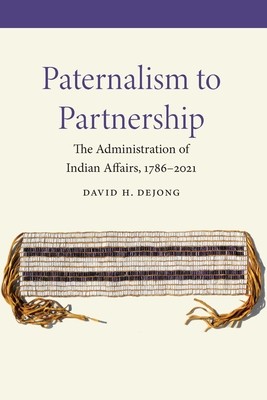
- We will send in 10–14 business days.
- Author: David H Dejong
- Publisher: University of Nebraska Press
- Year: 2022
- Pages: 510
- ISBN-10: 1496230582
- ISBN-13: 9781496230584
- Format: 15.2 x 22.9 x 3.2 cm, kieti viršeliai
- Language: English
- SAVE -10% with code: EXTRA
Reviews
Description
Paternalism to Partnership examines the administration of Indian affairs from 1786, when the first federal administrator was appointed, through 2021. David H. DeJong examines each administrator through a biographical sketch and excerpts of policy statements defining the administrator's political philosophy, drawn from official reports or the administrator's own writings.
The Indian Office, as an executive agency under the secretary of war (1789 to 1849) and secretary of the interior (1849 to present), was directed by the president of the United States. The superintendents, chief clerks, commissioners, and assistant secretaries for Indian affairs administered policy as prescribed by Congress and the president. Each was also given a level of discretion in administering this policy. For most of the federal-Indian relationship, administrators were limited in influencing policy. This paternalism continued well into the twentieth century. Beginning in the 1960s Congress and the president ameliorated their views on the federal-Indian relationship and moved away from paternalism. Since 1966 every administrator of the Bureau of Indian Affairs has been Native American, and each has exercised increasing authority in shaping policy. This has given rise to a federal-Indian partnership that has witnessed tribal nations again exercising their inherent rights of self-government.
In this documentary history David H. DeJong follows the progression of federal Indian policy over more than two hundred years, providing firsthand accounts of how the federal-Indian relationship has changed over the centuries.
David H. DeJong is director of the Pima-Maricopa Irrigation Project in Sacaton, Arizona. He is the author of numerous books, including Diverting the Gila: The Pima Indians and the Florence-Casa Grande Project, 1916-1928 and Stealing the Gila: The Pima Agricultural Economy and Water Deprivation, 1848-1921.
EXTRA 10 % discount with code: EXTRA
The promotion ends in 21d.17:42:20
The discount code is valid when purchasing from 10 €. Discounts do not stack.
- Author: David H Dejong
- Publisher: University of Nebraska Press
- Year: 2022
- Pages: 510
- ISBN-10: 1496230582
- ISBN-13: 9781496230584
- Format: 15.2 x 22.9 x 3.2 cm, kieti viršeliai
- Language: English English
Paternalism to Partnership examines the administration of Indian affairs from 1786, when the first federal administrator was appointed, through 2021. David H. DeJong examines each administrator through a biographical sketch and excerpts of policy statements defining the administrator's political philosophy, drawn from official reports or the administrator's own writings.
The Indian Office, as an executive agency under the secretary of war (1789 to 1849) and secretary of the interior (1849 to present), was directed by the president of the United States. The superintendents, chief clerks, commissioners, and assistant secretaries for Indian affairs administered policy as prescribed by Congress and the president. Each was also given a level of discretion in administering this policy. For most of the federal-Indian relationship, administrators were limited in influencing policy. This paternalism continued well into the twentieth century. Beginning in the 1960s Congress and the president ameliorated their views on the federal-Indian relationship and moved away from paternalism. Since 1966 every administrator of the Bureau of Indian Affairs has been Native American, and each has exercised increasing authority in shaping policy. This has given rise to a federal-Indian partnership that has witnessed tribal nations again exercising their inherent rights of self-government.
In this documentary history David H. DeJong follows the progression of federal Indian policy over more than two hundred years, providing firsthand accounts of how the federal-Indian relationship has changed over the centuries.
David H. DeJong is director of the Pima-Maricopa Irrigation Project in Sacaton, Arizona. He is the author of numerous books, including Diverting the Gila: The Pima Indians and the Florence-Casa Grande Project, 1916-1928 and Stealing the Gila: The Pima Agricultural Economy and Water Deprivation, 1848-1921.


Reviews